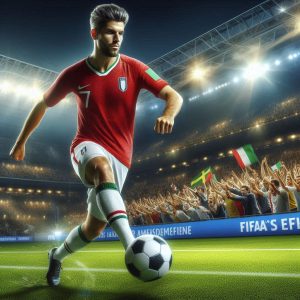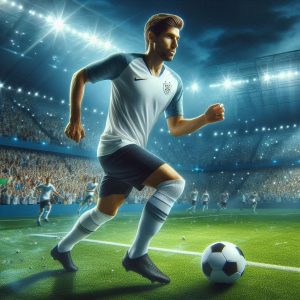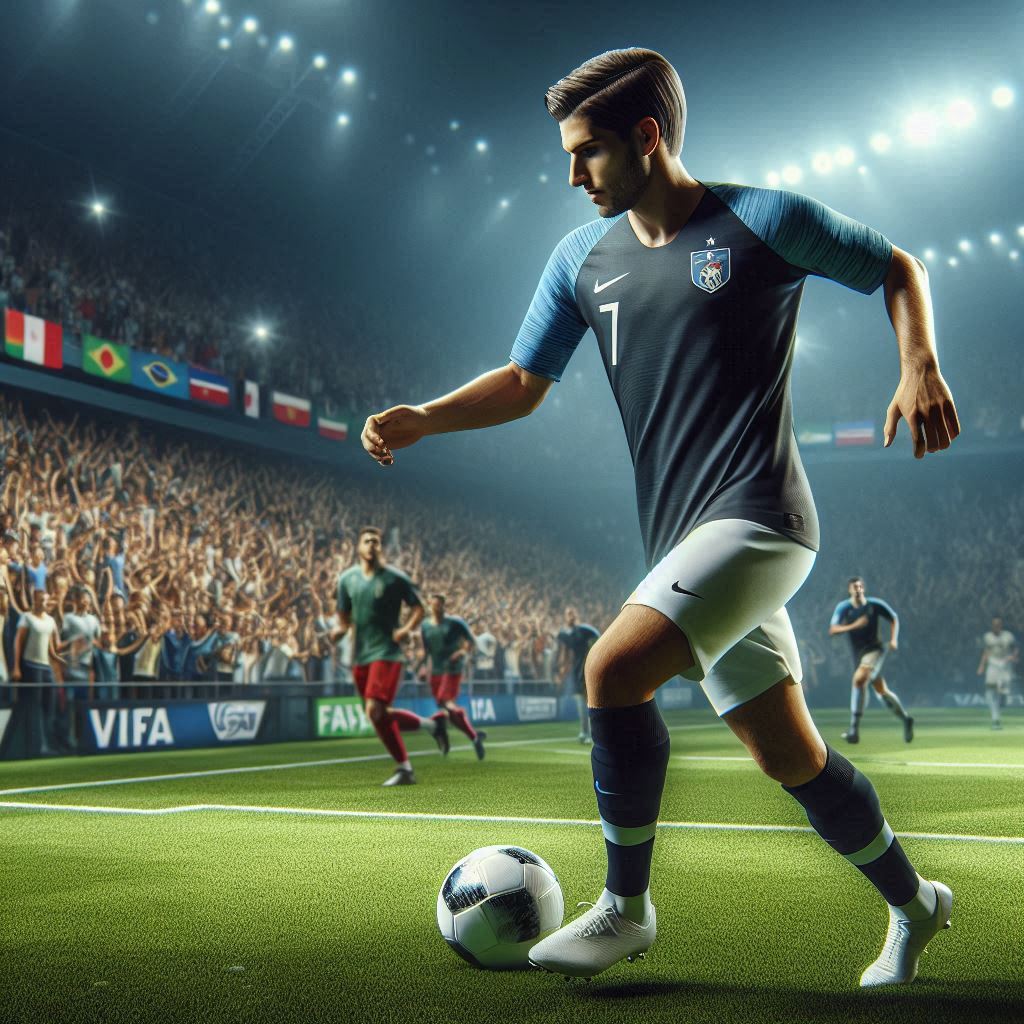Kevin De Bruyne: A Football Maestro
Table of Contents
ToggleIntroduction
Kevin De Bruyne, born on June 28, 1991, in Drongen, Belgium, is widely regarded as one of the most talented and influential midfielders in modern football. His exceptional vision, passing accuracy, and versatility have made him a pivotal player for both his club and the Belgian national team. This article delves into De Bruyne’s career, achievements, and impact on the sport.
Early Life and Career
Kevin De Bruyne began his football journey at a young age, joining the youth teams of KVV Drongen and then Gent. His impressive performances soon caught the eye of larger clubs, leading to his move to the Belgian Pro League side, Genk. At Genk, De Bruyne’s talent started to shine, and his playmaking abilities became evident.
Rise to Prominence
De Bruyne’s rise to prominence accelerated when he signed with Chelsea in January 2012. Although his time at Chelsea was challenging due to limited playing opportunities, his loan spell at Werder Bremen in the Bundesliga showcased his potential. His impressive performances in Germany led to his transfer to VfL Wolfsburg, where he truly made a mark.
Key Achievements
| Year | Award/Title | Details |
|---|---|---|
| 2015-16 | Premier League Player of the Season | Named best player in the Premier League during Manchester City’s title-winning season. |
| 2017 | Belgian Golden Shoe | Awarded the best Belgian footballer in the domestic league. |
| 2021 | UEFA Champions League Finalist | Led Manchester City to the final of the UEFA Champions League. |
Impact on Manchester City
Since joining Manchester City in 2015, De Bruyne has been instrumental in the club’s success. His creativity and vision have been crucial in City’s multiple Premier League titles and domestic cup victories. De Bruyne’s ability to dictate the pace of the game and deliver key passes has made him a fan favorite and a vital cog in City’s tactical setup.
For more details on his time at Manchester City, you can refer to [Manchester City Official Website](https://www.mancity.com) for the latest updates and statistics.
International Career with Belgium
On the international stage, De Bruyne has been a key player for Belgium. His performances have been crucial in Belgium’s strong showings in major tournaments, including the 2018 FIFA World Cup, where Belgium finished third. His role in the team’s midfield has been central to Belgium’s tactical approach and success.
Success Stories and Exemplary Cases
Kevin De Bruyne’s journey from a promising young talent to a global football star is a testament to his skill, dedication, and perseverance. His success on the field has not only brought him numerous accolades but also inspired many young footballers around the world. His story highlights the importance of seizing opportunities and continuously improving one’s game.
Conclusion
Kevin De Bruyne’s career is a shining example of excellence in football. His contributions to both club and country have cemented his status as one of the great midfielders of his generation. As he continues to perform at the highest level, fans and analysts alike eagerly anticipate his future achievements and contributions to the beautiful game.
References and External Links
- BBC Sport – Kevin De Bruyne Profile
- UEFA Champions League Player Ratings
- The Guardian – Kevin De Bruyne’s World Cup Impact
- Manchester Evening News – De Bruyne’s Contribution to Manchester City
- FIFA Player Profile – Kevin De Bruyne
Good Habits
1. Exceptional Work Ethic

De Bruyne’s dedication to his craft is evident in his rigorous training regimen and relentless pursuit of improvement. His work ethic is reflected in the way he consistently performs at a high level, whether during matchdays or in training sessions. This commitment to excellence ensures that he is always at the peak of his physical and mental capabilities.
Success Story: Transformation at Manchester City
Upon joining Manchester City, De Bruyne underwent significant physical and tactical development. His intense training routines, combined with a focus on understanding Pep Guardiola’s tactical demands, allowed him to become a central figure in City’s midfield. His work ethic has been instrumental in City’s multiple Premier League titles and domestic cups.
2. Mental Resilience
The ability to stay focused and composed under pressure is another of De Bruyne’s notable attributes. He demonstrates mental resilience during high-stakes matches, maintaining his composure and making decisive plays when it matters most.
Success Story: UEFA Champions League Performance
De Bruyne’s performance in the 2020-2021 UEFA Champions League was a testament to his mental strength. Despite a challenging match against Chelsea in the final, he remained a critical player for City, showcasing his ability to perform under the most intense pressure.
3. Versatility and Adaptability
De Bruyne’s ability to play in various midfield roles is a testament to his versatility. Whether positioned as an attacking midfielder, central playmaker, or even deeper as a box-to-box midfielder, he adapts his game to meet the needs of his team.
Success Story: Euro 2020
During the Euro 2020 tournament, De Bruyne’s adaptability was on full display. He seamlessly shifted between attacking and deeper roles, contributing significantly to Belgium’s progress in the competition and showcasing his ability to influence the game from multiple positions.
4. Strong Leadership Qualities
De Bruyne’s leadership on the field is characterized by his ability to inspire and motivate his teammates. He leads by example, demonstrating a high level of professionalism and commitment, which positively impacts team dynamics.
Success Story: Manchester City’s Premier League Triumphs
As a leader at Manchester City, De Bruyne played a crucial role in the team’s Premier League triumphs. His leadership, both in terms of performance and attitude, has been pivotal in fostering a winning mentality within the squad.
5. Continuous Learning and Adaptation
De Bruyne’s commitment to learning and evolving his game is evident in his approach to football. He constantly seeks to improve his skills and understanding of the game, which allows him to stay ahead of his competitors.
Success Story: Evolution under Pep Guardiola
Under Pep Guardiola, De Bruyne has evolved his game significantly. Guardiola’s influence has helped him refine his tactical awareness and decision-making, enhancing his overall effectiveness on the field.
Bad Habits
1. Injury Concerns
De Bruyne has faced several injury issues throughout his career, which have sometimes impacted his availability and performance. These injuries have occasionally hindered his ability to maintain consistent form and contribute fully to his team’s success.
Challenge: Impact of Injuries on Consistency
Injuries, such as those sustained during the 2020-2021 season, have occasionally sidelined De Bruyne, affecting Manchester City’s performance. Addressing these injury concerns remains a challenge for him and his medical team.
2. Occasional Frustration and Impulsiveness
De Bruyne’s passion for the game sometimes manifests as frustration, particularly when things do not go as planned. This can lead to moments of impulsiveness or disagreements with referees and opponents.
Challenge: Managing Frustration
De Bruyne’s frustration, especially when facing adverse decisions or poor performances, can sometimes result in disciplinary issues or affect his focus. Managing this aspect of his behavior is crucial for maintaining his effectiveness and professionalism.
3. Pressure of Expectations
As one of the top footballers in the world, De Bruyne often faces immense pressure and high expectations. This can sometimes lead to increased stress and impact his performance.
Challenge: Handling High Expectations
The weight of expectations, both from fans and media, can add pressure to De Bruyne’s performances. Balancing these expectations while maintaining peak performance is an ongoing challenge.
4. Lack of Defensive Discipline
While De Bruyne excels in attacking and creative roles, his defensive discipline has occasionally been questioned. His tendency to focus more on offensive contributions can sometimes leave gaps in the midfield.
Challenge: Improving Defensive Contributions
Enhancing his defensive responsibilities and understanding of positioning can help De Bruyne become a more well-rounded player. Addressing this aspect of his game is important for his overall effectiveness.
5. Over-Reliance on Physical Attributes
De Bruyne’s reliance on his physical attributes, such as pace and strength, can sometimes overshadow other aspects of his game. This can lead to an imbalance in his overall performance.
Challenge: Balancing Physical and Technical Skills
Striking a balance between leveraging his physical attributes and developing his technical skills is essential for De Bruyne’s continued success. This balance will help him remain effective and adaptable in various match situations.
Conclusion
Kevin De Bruyne’s journey as a football maestro is marked by a combination of exceptional good habits and notable challenges. His work ethic, mental resilience, versatility, leadership, and commitment to continuous learning have been crucial to his success. However, addressing issues related to injuries, frustration, high expectations, defensive discipline, and balancing physical attributes with technical skills remains essential for his ongoing development and impact on the game. As De Bruyne continues to evolve, his ability to navigate these challenges will define his legacy as one of the great footballers of his generation
Frequently Asked Questions (FAQs) about Kevin De Bruyne
1. Who is Kevin De Bruyne?

Kevin De Bruyne is a professional footballer from Belgium, widely regarded as one of the best midfielders in the world. Born on June 28, 1991, in Drongen, Belgium, De Bruyne currently plays for Manchester City in the English Premier League and represents the Belgian national team. Known for his exceptional vision, passing accuracy, and versatility, De Bruyne has earned numerous accolades throughout his career, including multiple Premier League titles and domestic cups with Manchester City.
2. What are Kevin De Bruyne’s main strengths on the football field?
Kevin De Bruyne’s strengths include:
- Vision: His ability to see and execute intricate passes is unmatched, often creating scoring opportunities for his teammates.
- Passing Accuracy: De Bruyne is known for his precise and creative passing, whether it’s short, long, or through balls.
- Versatility: He can play in various midfield roles, including as an attacking midfielder, central playmaker, or deeper as a box-to-box midfielder.
- Work Rate: His relentless energy and commitment on both ends of the pitch are vital to his team’s performance.
- Shooting: De Bruyne has a powerful and accurate shot, making him a threat from distance.
3. What has been Kevin De Bruyne’s impact at Manchester City?
Since joining Manchester City in 2015, Kevin De Bruyne has had a significant impact on the team:
- Premier League Titles: De Bruyne has been instrumental in Manchester City’s multiple Premier League victories, contributing with crucial goals and assists.
- Domestic Cups: He has played a key role in Manchester City’s successes in domestic cup competitions, including the FA Cup and EFL Cup.
- Playmaking: His vision and creativity have been central to City’s attacking play, often leading the league in assists.
- Tactical Flexibility: De Bruyne’s ability to adapt to various tactical setups under Pep Guardiola has been crucial for the team’s success.
4. What challenges has Kevin De Bruyne faced in his career?
Despite his success, De Bruyne has faced several challenges:
- Injuries: De Bruyne has experienced multiple injuries throughout his career, which have occasionally hindered his availability and performance.
- High Expectations: Being one of the top footballers comes with immense pressure and high expectations from fans, media, and teammates.
- Defensive Discipline: His primary focus on attacking roles has sometimes led to questions about his defensive contributions.
5. How does Kevin De Bruyne manage his injuries?
Kevin De Bruyne manages his injuries through a combination of:
- Medical Care: He works closely with medical professionals to ensure proper diagnosis and treatment of injuries.
- Rehabilitation: De Bruyne follows comprehensive rehabilitation programs to recover and regain fitness.
- Preventive Measures: He undergoes regular assessments and takes preventive measures to avoid future injuries.
6. What is Kevin De Bruyne’s playing style?
Kevin De Bruyne’s playing style is characterized by:
- Creative Passing: His ability to deliver precise and inventive passes helps unlock opposition defenses.
- Dynamic Movement: De Bruyne’s movement off the ball allows him to find space and create opportunities.
- Long-Range Shooting: He is known for his powerful shots from distance, often scoring spectacular goals.
- Aggressive Pressing: De Bruyne’s work rate includes aggressive pressing to regain possession high up the pitch.
7. How has Kevin De Bruyne’s role evolved under Pep Guardiola at Manchester City?
Under Pep Guardiola, Kevin De Bruyne’s role has evolved significantly:
- Tactical Flexibility: De Bruyne has adapted to various tactical roles, including deeper positions and more advanced playmaking roles.
- Increased Responsibility: His role has expanded to include greater involvement in both defensive and offensive phases of the game.
- Enhanced Creativity: Guardiola’s tactics have allowed De Bruyne to exploit his creative abilities more effectively, leading to a more dynamic and fluid attacking style.
8. What are some of Kevin De Bruyne’s notable achievements and awards?
Kevin De Bruyne’s notable achievements and awards include:
- Premier League Titles: Multiple Premier League titles with Manchester City (e.g., 2017-18, 2018-19).
- Football Writers’ Association Footballer of the Year: Awarded in the 2019-20 season.
- PFA Player of the Year: Nominated for several seasons, winning in the 2019-20 season.
- UEFA Champions League: Reached the final with Manchester City in the 2020-21 season.
9. How does Kevin De Bruyne contribute to the Belgian national team?
Kevin De Bruyne contributes to the Belgian national team by:
- Creative Playmaking: His vision and passing are crucial for Belgium’s attacking play, often creating scoring opportunities.
- Leadership: As one of the senior players, De Bruyne provides leadership and experience.
- Key Goals: He scores important goals and provides assists in crucial matches, including major tournaments like the World Cup and European Championship.
10. What are some of Kevin De Bruyne’s personal interests and activities outside football?
Outside football, Kevin De Bruyne is involved in:
- Charity Work: He supports various charitable causes and participates in community outreach programs.
- Family Life: De Bruyne values spending time with his family and often shares moments with them on social media.
- Business Ventures: He has engaged in various business ventures, including endorsements and personal brand development.
11. How does Kevin De Bruyne handle the pressure and expectations placed on him?
Kevin De Bruyne handles pressure and expectations by:
- Maintaining Focus: He stays focused on his performance and goals, regardless of external pressures.
- Mental Resilience: His mental toughness helps him stay composed and perform at his best under high-stress situations.
- Support System: De Bruyne relies on his support system, including family, teammates, and coaching staff, to manage stress and maintain balance.
12. What are the future prospects for Kevin De Bruyne?
The future prospects for Kevin De Bruyne include:
- Continued Success with Manchester City: He is likely to remain a key player for Manchester City and contribute to their success.
- International Achievements: De Bruyne will continue to play a pivotal role in Belgium’s national team, aiming for success in future tournaments.
- Legacy Building: His ongoing performances and achievements will further cement his legacy as one of the great midfielders of his generation.
13. How does Kevin De Bruyne’s playing style compare to other top midfielders?
Kevin De Bruyne’s playing style is often compared to:
- Paul Pogba: Both are known for their physicality and creative abilities, though De Bruyne is typically seen as more consistent in his passing and playmaking.
- Luka Modric: De Bruyne and Modric share similarities in vision and passing, but De Bruyne is often noted for his more dynamic attacking contributions.
- Bruno Fernandes: While Fernandes is known for his goal-scoring ability and playmaking, De Bruyne’s versatility and defensive contributions offer a different dimension.
14. How has Kevin De Bruyne’s career been affected by the COVID-19 pandemic?
The COVID-19 pandemic has impacted Kevin De Bruyne’s career in several ways:
- Match Schedule Disruptions: The pandemic led to interruptions and changes in match schedules, affecting team performance and individual preparation.
- Training Adjustments: De Bruyne had to adapt to new training protocols and restrictions during the pandemic.
- Mental and Physical Challenges: The pandemic brought challenges related to maintaining fitness and mental well-being in a changed environment.
15. What advice does Kevin De Bruyne offer aspiring footballers?
Kevin De Bruyne’s advice to aspiring footballers includes:
- Hard Work: Emphasize the importance of dedication and continuous improvement in training.
- Mental Strength: Develop resilience and the ability to handle pressure and setbacks.
- Versatility: Work on becoming a well-rounded player with multiple skills and roles.
- Passion for the Game: Maintain a genuine love for football and a drive to succeed.
16. What are some of Kevin De Bruyne’s most memorable goals?
Some of Kevin De Bruyne’s most memorable goals include:
- Against Chelsea (2019-20 Premier League): A stunning long-range shot that demonstrated his ability to score from distance.
- Against Tottenham Hotspur (2019-20 UEFA Champions League): A crucial goal in the quarter-final match, showcasing his composure and finishing ability.
- Against Brazil (2018 FIFA World Cup): A key goal in the World Cup quarter-final, helping Belgium secure a place in the semi-finals.
17. What are the key aspects of Kevin De Bruyne’s training regimen?
Key aspects of Kevin De Bruyne’s training regimen include:
- Physical Conditioning: Regular fitness sessions to maintain strength, agility, and endurance.
- Technical Drills: Focused drills to enhance passing accuracy, shooting, and ball control.
- Tactical Work: Sessions to understand and implement tactical strategies and team dynamics.
- Recovery: Emphasis on recovery techniques, including physiotherapy, rest, and nutrition, to prevent injuries and maintain peak performance.
18. How does Kevin De Bruyne balance his professional and personal life?
Kevin De Bruyne balances his professional and personal life by:
- Time Management: Efficiently managing his schedule to accommodate both football commitments and personal activities.
- Family Time: Prioritizing time with his family and engaging in activities that provide relaxation and enjoyment.
- Hobbies and Interests: Pursuing interests outside football, such as charity work and personal projects, to maintain a well-rounded lifestyle.
Disclaimer and Caution Regarding Kevin De Bruyne
Introduction

This document provides a comprehensive disclaimer and caution regarding the information and opinions presented about Kevin De Bruyne. As one of the most prominent footballers of his generation, De Bruyne’s career, achievements, and personal attributes are frequently discussed and analyzed. This disclaimer aims to clarify the limitations and potential issues associated with the information provided, ensuring that readers approach the content with a balanced perspective.
1. Accuracy and Reliability of Information
1.1 Information Sources
The information provided about Kevin De Bruyne is based on publicly available sources, including news articles, interviews, official club statements, and statistical data. While efforts have been made to ensure accuracy, the dynamic nature of sports and the frequent updates in player statistics, performances, and personal details may lead to changes that are not immediately reflected in this document.
1.2 Verification of Facts
Readers are advised to verify facts through multiple reputable sources before drawing conclusions or making decisions based on the information provided. The data on De Bruyne’s career achievements, personal attributes, and professional experiences is subject to change, and the latest updates from official sources or credible sports news outlets should be consulted for the most current information.
2. Limitations of Analysis
2.1 Subjectivity in Assessments
The assessments of Kevin De Bruyne’s strengths, weaknesses, and career impact are inherently subjective. Opinions on his playing style, contributions to Manchester City, and performances for the Belgian national team are influenced by individual perspectives and may vary among different analysts, fans, and experts.
2.2 Evolving Career
Kevin De Bruyne’s career is ongoing, and his performance, achievements, and challenges may evolve over time. The analysis presented reflects his status as of the latest updates but may not account for recent developments or future changes in his career. Readers should be aware that new achievements, injuries, or changes in his professional circumstances could alter the context of the information.
3. Personal and Professional Insights
3.1 Privacy Considerations
Personal insights into Kevin De Bruyne’s life, including his family, personal interests, and off-field activities, are shared based on publicly available information. Respect for his privacy is paramount, and this document does not delve into sensitive personal matters that are not publicly disclosed or relevant to his professional career.
3.2 Interpretation of Behavior
Interpretations of De Bruyne’s behavior, including his responses to injuries, pressure, or high expectations, are based on observed patterns and public statements. These interpretations may not fully capture the complexities of his personal experiences or mental state. Caution should be exercised when making judgments about his character or motivations based on limited information.
4. Potential Biases and Conflicts of Interest
4.1 Bias in Reporting
The analysis and commentary on Kevin De Bruyne’s career may be influenced by the sources of information and the perspectives of the authors or analysts. Biases in reporting, whether intentional or unintentional, can affect the portrayal of De Bruyne’s achievements and challenges. Readers should consider diverse viewpoints and sources to gain a balanced understanding.
4.2 Sponsorship and Endorsements
Any information related to Kevin De Bruyne’s endorsements, sponsorships, or business ventures may involve commercial interests. While such information is included for completeness, it should not be interpreted as an endorsement or recommendation of specific products, services, or brands associated with De Bruyne.
5. Injuries and Health Concerns
5.1 Medical Accuracy
Information regarding Kevin De Bruyne’s injuries and health concerns is provided based on publicly available reports and statements. Medical details are often generalized, and specific diagnoses or treatment plans are not disclosed publicly. Readers should consult medical professionals or official sources for accurate information regarding sports injuries and health management.
5.2 Impact on Performance
The impact of injuries on De Bruyne’s performance is discussed based on observed patterns and reported issues. However, the effects of injuries can vary widely among individuals, and the full extent of their impact may not be fully visible to the public. Caution should be exercised when interpreting the implications of injuries on De Bruyne’s career.
6. Expectations and Future Prospects
6.1 Speculative Analysis
Predictions about Kevin De Bruyne’s future achievements, career trajectory, or potential impacts are speculative and based on current trends and historical patterns. Future developments in his career are uncertain and influenced by numerous factors, including team dynamics, personal decisions, and external conditions.
6.2 Influence of External Factors
External factors, such as changes in team management, shifts in football regulations, or global events, can affect De Bruyne’s career prospects. The information presented may not fully account for the impact of such factors on his future performance and achievements.
7. Fan Opinions and Public Perception
7.1 Subjective Opinions
Public opinions and fan perceptions of Kevin De Bruyne are subjective and can vary widely. The information and opinions presented in this document may reflect the views of specific individuals or groups and may not represent a consensus among all stakeholders.
7.2 Influence of Media
Media portrayals of De Bruyne can influence public perceptions and opinions. Media coverage may focus on particular aspects of his career or personal life, potentially shaping the way he is perceived by fans and analysts. Readers should be mindful of the potential influence of media narratives on their understanding of De Bruyne.
8. Legal and Ethical Considerations
8.1 Legal Disclaimers
This document does not constitute legal advice or a professional endorsement of any kind. Information regarding Kevin De Bruyne is provided for informational purposes only, and readers should seek professional advice for legal or contractual matters related to sports and entertainment.
8.2 Ethical Reporting
Efforts have been made to ensure ethical reporting and respect for Kevin De Bruyne’s privacy. However, readers should be aware of the potential ethical considerations involved in discussing the personal and professional aspects of public figures. Sensitivity and respect for individual privacy should be maintained at all times.
9. Usage and Responsibility
9.1 Personal Responsibility
Readers are responsible for their own interpretations and conclusions based on the information provided. This document aims to offer a balanced view but does not guarantee accuracy or completeness. Users should exercise critical thinking and consult additional sources as needed.
9.2 No Endorsements
This document does not endorse or recommend any specific products, services, or opinions related to Kevin De Bruyne. The content is intended to provide a general overview and should not be construed as a personal endorsement or recommendation.
10. Conclusion
The information provided about Kevin De Bruyne is intended to offer insights into his career, achievements, and personal attributes. However, it is important to approach this content with an understanding of its limitations, including potential biases, evolving circumstances, and the subjective nature of analysis. By acknowledging these factors, readers can form a more nuanced and informed perspective on one of football’s most celebrated players.



